Artificial Intelligence in Medical Research: A New Frontier | 2024
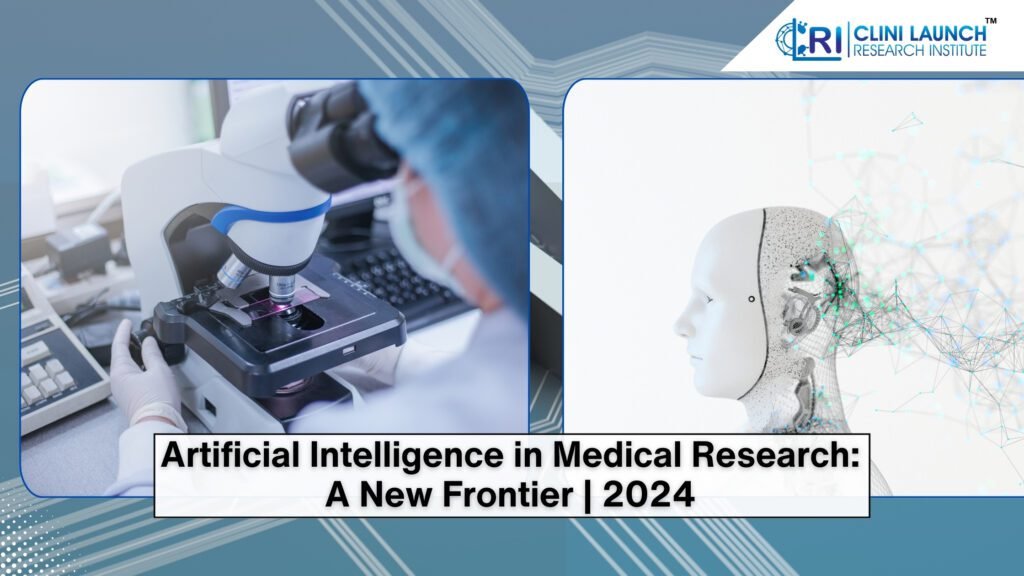
Artificial intelligence in medical research is being revolutionized, changing the entire healthcare landscape. The intricacies of large datasets, complicated biological systems, and the challenging process of drug development have long bedeviled researchers. The development of efficient medicines for many illnesses has been severely hampered by these obstacles. Traditional research methodologies rely on manual human data processing and interpretation. More to all of this they are not designed to handle the size and complexity of contemporary datasets. The process of extracting valuable ideas from this enormous body of data is labor-intensive and time-intensive, which ultimately slows down the evolution of medicine research. Artificial Intelligence in Medical Research The realm of medical research is undergoing a profound transformation, ultimately fueled by an unprecedented surge in data generation. From genetic sequences and medical imaging to electronic health records (EHRs), the volume and complexity of data available to researchers are expanding at an exponential rate in today’s times. While offering enormous promise for ground-breaking discoveries, this data flood has also brought up several serious obstacles. Artificial intelligence (AI) is a new frontier that is emerging to address these difficulties. AI can uncover hidden patterns and connections in medical data by utilizing sophisticated algorithms and computer capacity. This might hasten the development of novel therapies and cures. The Challenge of Medical Data Data in the medical profession is being produced at an incredible rate. Large volumes of genetic data, crucial for understanding disease susceptibility and identifying potential therapeutic targets, are generated through genomics research. Medical imaging technology produces high-resolution images, essential for detailed analysis of physiological functions and anatomical structures. Furthermore, EHRs captures a multitude of patient data, including medical history, diagnosis, prescriptions, and lab results. While this data represents a goldmine of information for medical research, there are many challenges that hinder its effective utilization too. Agendas like data silos, inconsistent formats, and privacy concerns complicate data integration initiatives but the sheer volume of data overwhelms conventional statistical methods, making it all the more difficult to extract meaningful insights and discover hidden patterns. Creative solutions are needed to solve these issues and realize the full potential of medical data. In order to get past these obstacles, artificial intelligence in medical research appears to be a potential solution. Through the use of machine learning for research insights and big data analytics, researchers may expedite the development of novel treatments and cures by delving deeper into intricate datasets and identifying patterns. As a result, researchers frequently struggle to extract usable insights from massive amounts of data. The limits of manual analysis become more evident as the complexity of medical research increases. To solve these issues and maximize the value of medical data, innovative solutions are necessary. Artificial intelligence in medical research appears to be a potential solution to overcoming all these old worries. By leveraging machine learning and big data analytics in healthcare, researchers may dive deeper into complicated information, spot trends, and speed up the development of novel treatments and cures. AI – A Catalyst for Medical Breakthroughs The combination of enormous datasets and enhanced computer capacity has signaled a new era in medical research. Artificial intelligence (AI), notably machine learning for research insights, is driving this shift. By allowing computers to learn from data without explicit programming, AI enables researchers to glean new insights from previously daunting datasets. CliniLaunch recognizes the transformative potential of artificial intelligence in medical research and offers specialized training to equip professionals with the skills to harness its power. From accelerating drug discovery to enhancing disease diagnosis, AI is driving groundbreaking advancements in healthcare. By mastering machine learning for research insights, individuals can contribute to improving patient outcomes and shaping the future of medicine. Harnessing the Power of Big Data for Medical Breakthroughs Data mining in big data analytics is transforming medical research by extracting significant trends and patterns from large databases. CliniLaunch recognizes the revolutionary power of big data and provides specialized training to upskill professionals with the necessary skills to optimize treatments in the field. Researchers may dive deeply into complicated data using advanced analytics approaches, revealing hidden patterns that fuel innovation. AI-powered technologies make it easier to analyze patient records, genetic information, and clinical trial data, allowing for trend discovery, result prediction, and therapy optimization. Big data analytics aims to accelerate medication discovery. By searching through massive chemical databases, researchers may find prospective medication candidates, forecast their efficacy and safety, and simplify the development process. This data-driven method allows patients to receive life-saving drugs sooner. Click here to learn more about the AI & ML course at CliniLaunch Precision Medicine and AI Precision medicine aims to tailor medical treatment to patients characteristics of each patient. This approach is transforming healthcare by optimizing treatment plans and improving patient outcomes. AI plays an important role in precision medicine by simplifying patient classification and biomarker discovery. AI can use machine learning algorithms to analyze massive volumes of patient data (as data mining in medicine) and find subgroups with similar features, hence optimizing therapy choices. Furthermore, AI expedites the finding of biomarkers, which are molecular indications of illness or therapy response and are critical for designing personalized medicines. While the potential benefits of AI in precision medicine are enormous, ethical concerns must be carefully considered. CliniLaunch emphasizes the need for ethical AI adoption to protect patient privacy, data security, and algorithmic fairness with upskilling. Overcoming Challenges and Future Outlook While the potential for artificial intelligence in medical research is enormous, certain hurdles must be met. Data privacy and security are top priorities, since sensitive patient information must be safeguarded. Furthermore, algorithmic bias might provide erroneous or discriminating results, impeding the equal use of AI. To address these difficulties, strong data governance structures and ethical principles are required. Continuous monitoring and assessment of AI systems are required to detect and correct biases. Furthermore, investing in AI education and training is critical for creating a competent workforce capable of developing and deploying AI solutions efficiently. CliniLaunch emphasizes the need for responsible AI development
Lung Cancer Symptoms – Don’t ignore these warning signs
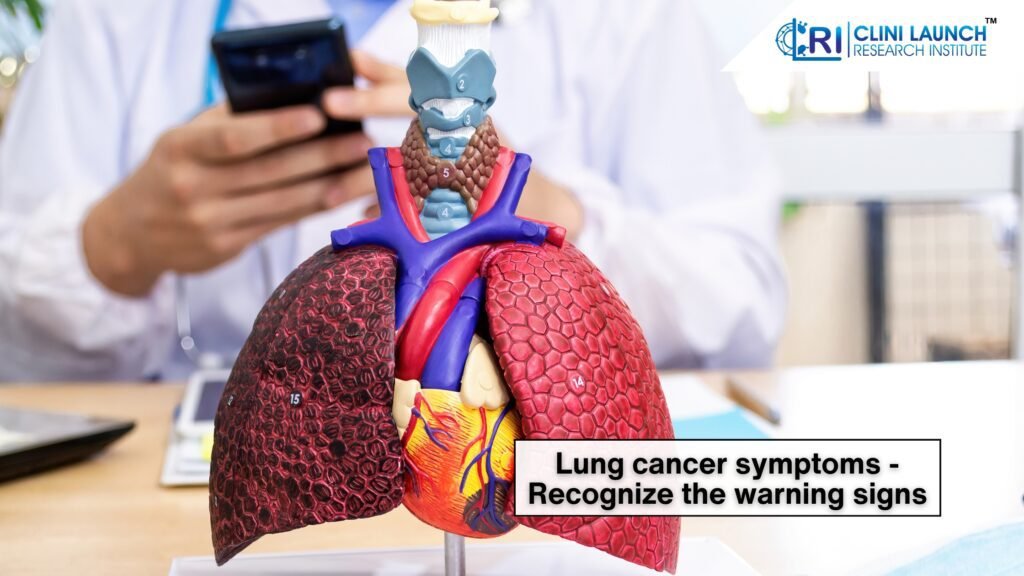
Lung cancer is a leading cause of health concern, but early detection through lung cancer symptoms can significantly improve treatment outcomes for better patient care. Recognizing the body’s warning signs is crucial. Lung cancer symptoms – Recognize the warning signs While smoking is by far the major risk factor, it’s not the only one. Many develop lung cancer without a history of smoking too. While lung cancer symptoms may seem concerning and increasing all around at an alarming rate, this blog empowers one with the knowledge of how to understand and gauge things better. We explore the common warning signs, the importance of early detection for successful treatment, and the promising advancements in lung cancer diagnosis and therapy. By the end, one should be equipped to recognize the signs and take control of your health. Difficulty recognizing early warning signs Early lung cancer symptoms can be subtle and may easily be mistaken for other conditions as well. But persistent cough, shortness of breath causing breathlessness, and chest pain are often the most common recognizable signs. However, these symptoms can also be caused by infections, allergies, or even asthma if considered. But if not diagnosed right, it can lead to potentially worse outcomes. This is the reason early detection is essential for exploring various lung cancer therapy options and achieving a positive prognosis. Knowing the Warning Signs of Lung Cancer Remember! Lung cancer often whispers warnings before it shouts. So, moving further let’s delve deeper into the telltale signs the human body might give if lung cancer is present. Recognizing lung cancer symptoms is the first step towards early detection and successful treatment. Beyond the common symptoms – Less frequently discussed warning signs of lung cancer While a persistent cough is a reasonably important warning sign, lung cancer can sometimes present with more subtle symptoms. Let’s explore some lung cancer symptoms that might not be as readily discussed but are still important to be aware of: Importance of early detection for successful lung cancer treatment Early detection significantly improves the chances of successful lung cancer treatment. When lung cancer is caught in its early stages, the treatment options are more effective on the body, and the prognosis is much better. In fact, according to the American Cancer Society, the 5-year survival rate for lung cancer detected at an early stage is 57%, whereas it is only 4% for lung cancer detected in the later stages. Thus, early detection allows for minimally invasive procedures like surgery and radiation therapy, potentially leading to better quality of life for patients undergoing treatment. The future of lung cancer diagnosis and therapy The medical field is constantly evolving in today’s times, offering hope for improved lung cancer diagnosis and treatment across the globe. New technologies have been developed such as low-dose CT scans that are becoming increasingly accessible for early detection. Additionally, research happening in blood tests for lung cancer screening is underway to try and find remedies for this as well. These advancements offer a lot of promise for even more effective diagnosis and the development of innovative lung cancer therapies in the future. Concluding thoughts Lung cancer remains a severe health problem, but early identification using lung cancer signs is critical. Smoking is a significant risk factor, but it is not the only one. Recognizing warning signals such as a persistent cough, shortness of breath, and chest discomfort allows you to take control. Early discovery leads to improved treatment choices and a better prognosis. The future seems promising, with advances in diagnosis such as low-dose CT scans and prospective blood testing, as well as breakthrough lung cancer medicines. Be alert and see a doctor if you have any persistent symptoms. Early discovery can save lives. Early detection is key, and advancements in AI and machine learning in Healthcare offer exciting possibilities for the future of lung cancer diagnosis and treatment. For more details, visit www.clinilaunchresearch.in. Krishna Talreja Content Strategist A dynamic content marketing professional with expertise in brand storytelling and strategic content creation. Adept at managing diverse content projects, driving engagement, and enhancing brand visibility across multiple platforms.
Revolutionary AI Chatbots in Healthcare 2024
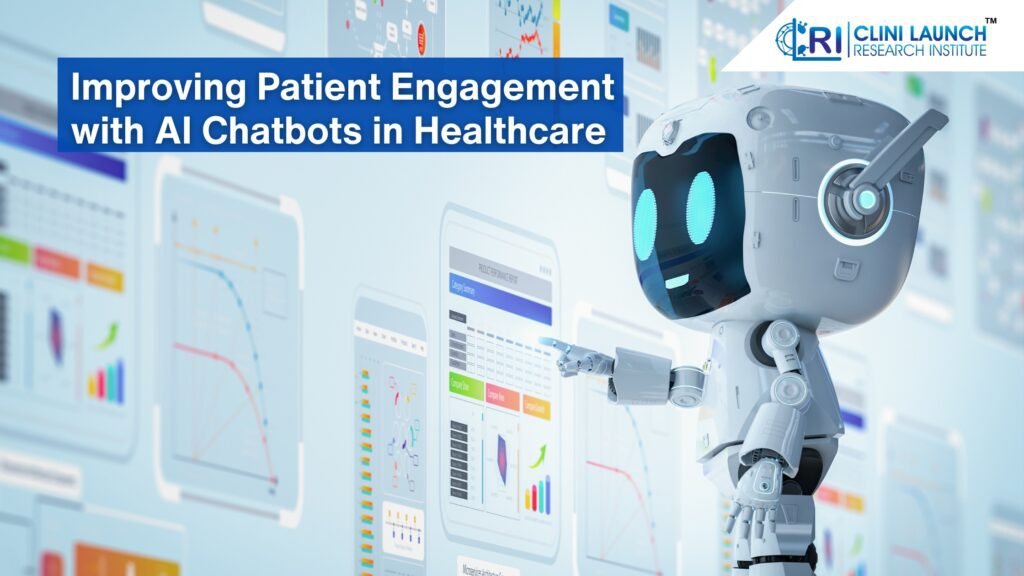
Nowadays, artificial intelligence is revolutionizing the healthcare industry while improving patient output and enhancing their experiences. According to Vantage Market Research, global AI in the healthcare market is projected to reach $178.66 billion by 2030 with a CAGR of 45.80%. The Bytes Technolab says, the integration of Natural Language Processing (NLP) allows AI chatbots in healthcare to shape the future of patient care. In addition to it, the advancements in machine learning enable chatbots to adapt and learn the process over time. With the advancements in analyzing past data with user interactions, chatbots can provide specific health information offering mental health support through techniques such as sentiment analysis. The technological revolution paves the way for sophisticated data systems that support AI and advanced analytics. It accelerates process automation, gains valuable insights, and improves patient quality care. In this blog post, we will explore AI chatbots in healthcare, virtual health assistants, patient communication tools, and how AI enhances patient experience. What is AI Chatbots in Healthcare? IBM concluded two benefits of AI Chatbots in healthcare including the promotion of efficient clinical resources and patient experience enhancement. So, an AI chatbot is an advanced and self-learning software program that replicates human-like conversations with its users. In healthcare, AI chatbot offers perspectives to interact with complex systems. While it gathers medical or other information from various platforms, it removes unnecessary information. These healthcare chatbots can save time & resources and while automating repetitive tasks, they can provide instant assistance to their users. How Virtual Health Assistants transform the patient journey? AI chatbots transform the patient journey as it helps alleviate the burden on healthcare providers. It can automate routine tasks such as scheduling appointments or setting up personalized healthcare reminders. Furthermore, virtual health assistance allows healthcare professionals to allocate time and resources to where they need it the most. While using chatbots, patients can answer questions seeking self-treatment or personalized medication. It can even track patient data such as blood pressure and glucose levels, and provide feedback on improving health outcomes. For more details on how AI is impacting the healthcare industry, check this out. Read: The Impact of Artificial Intelligence on Healthcare Benefits of AI Chatbots in Healthcare Improved Experiences with Patient Communication Tools As a conversational agent, patient communication tools can analyze patient-reported symptoms. By cross-referencing and providing personalized feedback in real-time, patients can improve their experiences with medical database accessibility. Artificial intelligence chatbots can bridge the language gaps serving a broader range of patients. It reduces the impact of health disparities internationally. With the integration into healthcare systems, chatbots can lead to increased in-patient engagement by empowering them to take charge of their health ensuring efficient medical resources. Efficient Interactions AI chatbots limit the need for receptionists, phone conversations with healthcare professionals, and call center agents streamlining the patient journey. It facilitates the process while removing the intermediary and automates basic tasks. By automating time-consuming processes in healthcare, chatbots free up medical professionals to focus on critical aspects of patient care. Ultimately, enhancing patient experience, these chatbots cater to unique needs while maintaining privacy and security for the healthcare future. Reduced Patient Appointments It can be time-consuming for patients to visit hospitals and clinics in person or it may be costly for patients. Although appointments are essential for diagnosis or treatments some of these can be avoidable at no cost. AI chatbots help streamline the process of appointments by discussing issues with patients while eliminating unnecessary visits. Furthermore, chatbots can offer solutions to simple problems by arranging or recommending visits for complex matters. Safety Enhancements The primary objective of medical professionals is to maintain patient care that requires direct contact. AI chatbots in healthcare enable patients to reach their healthcare providers, prioritizing certain cases, and instantly connecting them with appropriate professionals who can assist them. Chatbots can ultimately expedite healthcare for those who urgently need it and save time or resources for those who don’t need it. In Conclusion AI is transforming a patient’s journey in collaboration with healthcare professionals. The incorporation of AI chatbots in healthcare enables more personalized and efficient care while streamlining various processes throughout the user journey. This change provides healthcare professionals an opportunity to tap into advanced data analytics and machine learning which keeps automating the processes. By leveraging AI-powered patient communication tools such as predictive modeling and sentiment analysis, healthcare professionals can gain insights into preferences. Introducing CliniLaunch, a premier upskilling institute that offers a comprehensive curriculum for AI & ML in healthcare. If you are a student or early healthcare professional who wants to transform your career in the field of data analytics in healthcare or AI scientists, CliniLaunch is the best choice for you. For more details, fill up the registration form and one of our counselors will be connecting with you shortly.
Adequate Precision Medicine with AI & ML in 2024
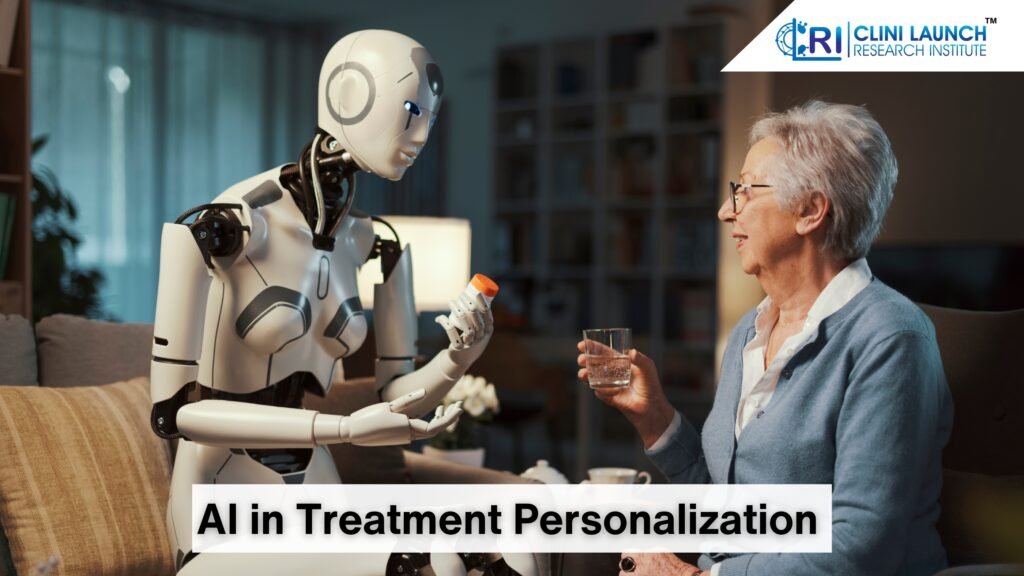
Imagine a future where healthcare isn’t a one-size-fits-all approach. A future where treatments are designed specifically for you, taking into account your unique genetic makeup, medical history, and lifestyle. This is the promise of precision medicine, also known as personalized medicine. By leveraging the power of Artificial Intelligence (AI) and Machine Learning (ML), precision medicine is revolutionizing how we diagnose and treat diseases. Traditionally, medicine has relied on a population-based approach. Treatments are designed for the “average” patient, often leading to suboptimal outcomes for some individuals. This can be due to variations in how our bodies respond to medications or the presence of underlying genetic factors. Precision medicine aims to bridge this gap by tailoring treatment plans to the specific needs of each patient, offering a more individualized treatment approach. AI in Treatment Personalization AI plays a crucial role in precision medicine by analyzing vast amounts of complex data. This data can include: By analyzing this multifaceted data, AI can: Read: Advanced Machine Learning In Medical Imaging Classified 2024 Machine Learning in Healthcare Customization Machine learning (ML), a subset of AI, is another powerful tool in the precision medicine arsenal. ML algorithms can learn from data without being explicitly programmed, constantly improving their ability to analyze and generate insights. In healthcare customization, ML is used for: The Benefits of Precision Medicine The potential benefits of precision medicine are numerous: Challenges and Considerations While the future of precision medicine is bright, there are still some challenges to overcome: The Future of Precision Medicine Despite the challenges, the future of precision medicine is full of promise. As AI and ML technologies continue to evolve, we can expect to see even greater advancements in this field. Here’s a glimpse into what the future might hold: The Road Ahead Precision medicine represents a paradigm shift in healthcare. By leveraging the power of AI and ML, we are moving towards a future where treatments are designed specifically for the individual. This holds immense potential for improving patient outcomes, reducing healthcare costs, and ultimately, revolutionizing the way we approach healthcare altogether. However, realizing the full potential of precision medicine requires a collaborative effort. Healthcare providers, researchers, policymakers, and technology companies all need to work together to address the challenges and ensure equitable access to these advancements. As we move forward, it’s important to remember that AI and ML are tools to be used in conjunction with human expertise, not replacements for it. The future of healthcare lies in the synergy between cutting-edge technology and the irreplaceable human touch. If you are a healthcare enthusiast who wants to pursue AI & ML for future prospecting or transition, consider CliniLaunch – best AI & ML in healthcare training institute in India.
Rethinking AI Drug Discovery in 2024: A Computational Revolution
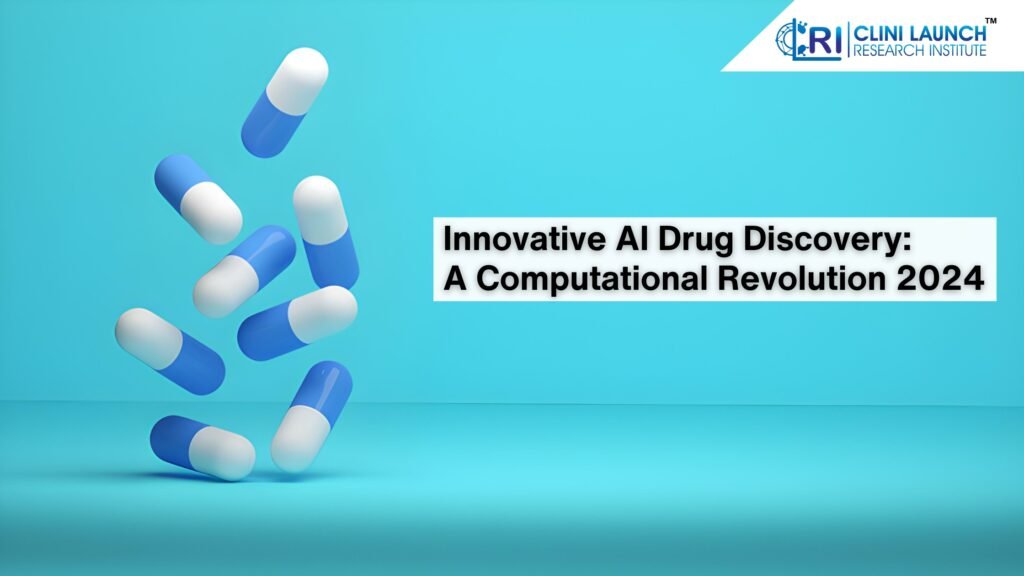
Due to brimming AI’s disruptive potential, the field of drug research is revolutionizing, driving the industry to go through substantial turmoil. In this blog, we will analyze the significant role of AI drug discovery in accelerating computational revolution. Let’s begin with how these technical advancements transform the manufacturing circumstances of the pharmaceutical industry by altering the production of life-saving drugs. How AI is Driving Pharmaceutical Research Advancements? AI-driven drug development has several advantages that boost the advancements in pharmaceutical research. The biggest benefit of using artificial intelligence is its ability to complete the task faster. AI can analyze massive datasets and find novel candidates much quicker than convenient. It is crucial to increase the speed to react immediately to emerging illnesses or health conditions that may lower expenses for drug development. With automation in data processing, forecasting therapeutic characteristics, and chemical structure optimization, AI can speed up pharmaceutical research and development. Due to this, pharmaceutical businesses can reduce debt and preserve existing resources. It also effectively creates better medications. Artificial intelligence can discover pharmacological prospects to interact with biological sickness signs while analyzing a massive dataset of biological and chemical data. This necessary step towards new therapies allows pharmaceutical companies to create safer and more effective medications. With medical development, driven by AI drug discovery may help discover new therapeutic targets finding it in massive genomic and proteomic datasets. Along with the expansion of medication discovery, artificial intelligence promotes pharmaceutical research advancements and innovation. As it improves pharmaceutical repurposing, it can also analyze pharmacological attributes and interactions. Learn how researchers develop life-saving treatments. Enroll now. The Slow and Costly Past of Drug Discovery Earlier, developing new medications was time-consuming and expensive. Researchers sift through various libraries of molecules, and in a while, they will test them one by one targeting specific diseases for their potential. This trial-and-error approach often led to dead ends as it was riddled with inefficiencies. Scope of AI Drug Discovery and Development Artificial intelligence and machine learning in drug development are transforming every stage of the drug discovery pipeline. Here you will find out how this powerful human-AI interaction is working: Target Identification and Validation Nowadays researchers analyze massive genetic and protein information datasets using advanced computer drug screening and AI algorithms. With this potent combination, AI helps identify promising drug targets missed previously. Target identification and validation empower researchers to streamline the process and increase the likelihood of targeting the root cause of a disease. In Silico Screening Can you imagine replacing manual library screening? AI drug discovery offers a powerful computational drug screening process. AI algorithms predict the molecular binding to a specific target through “in silico” screening. With the reduction in the number of physical experiments required, it saves the researchers valuable time and resources. However, human scientists curate the data used to train these algorithms and ultimately select the most promising candidates for further exploration. Lead Optimization Advanced computational drug screening helps analyze the structure-activity relationships of potential drug candidates. Lead optimization guides medicinal chemists in optimizing drug potency and selectivity, leading to more effective medications with fewer side effects. Human expertise remains crucial in interpreting the data and making key decisions throughout this process. Learn how researchers develop life-saving treatments. Enroll now. Conclusion To sum up, AI is transforming the drug development sector due to its many benefits. Its speed and efficiency can boost research and development, making it invaluable. This speeds up the delivery of life-saving medicines, which is crucial. AI may cut costs, improve therapeutic effectiveness, and expand drug target discovery, making it a formidable tool in pharmaceutical research. The search for novel drugs is poised for a significant leap forward. As these powerful computational tools and techniques continue to evolve, we can expect a surge in the development of more targeted, effective, and safer pharmaceuticals. This innovation has the potential to revolutionize healthcare on a global scale, aiding in the fight to eradicate illnesses and improve overall health outcomes. Visit: www.clinilaunchresearch.in
Artificial Intelligence in Healthcare: Revolutionizing Patient Care with ML Applications in 2024
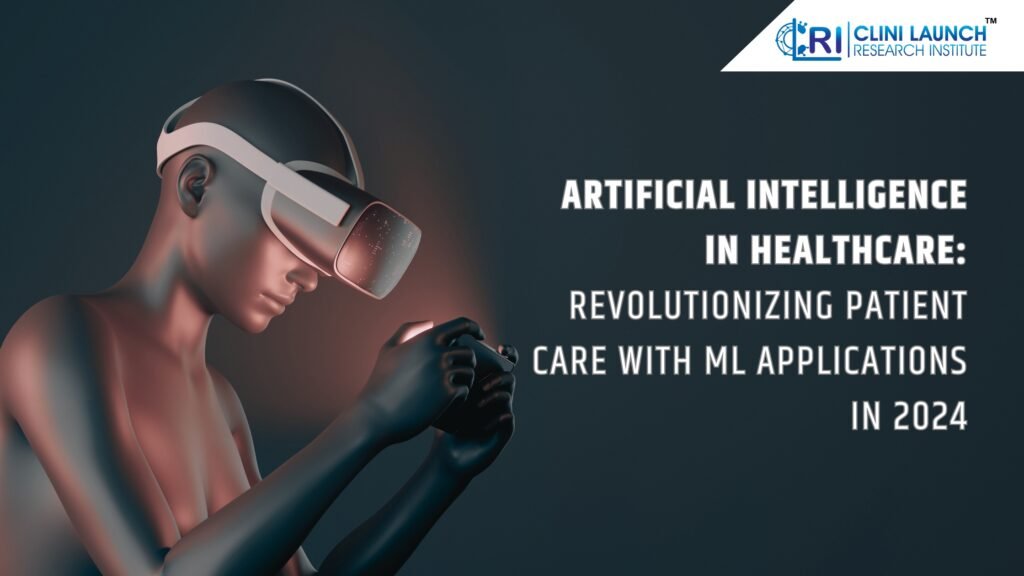
Artificial Intelligence in Healthcare Artificial Intelligence is widely accepted in businesses and society now and beginning to be applied to healthcare. Revolutionizing ML applications in 2024, Artificial intelligence in healthcare has the potential to transform multiple aspects of patient care along with administration processes within providers, payers, and pharmaceutical organizations. As the healthcare industry is shifting the innovative landscape with AI and ML, it is transforming the way to diagnose and manage health, and treatment. In this blog, we will delve deep into the exciting world of AI in Healthcare while exploring ML applications. Machine Learning (ML) Applications in Healthcare With the expansion in technological aspects of healthcare, machine learning improves personalized medication, accuracy in diagnosis, and has the potential to find dynamic solutions to traditional methods. By using machine learning (ML) applications in healthcare, you can programme computers to make connections, predictions, and discover insights from huge datasets that healthcare providers may miss out on. The main goal of machine learning is to improve patient care while producing medical insights that were unavailable before. Doctors may validate their reasoning and decision-making process through predictive algorithms. Suppose, a doctor is prescribing a specific medication to a patient, and simultaneously, machine learning validates the medication history of another patient who benefits from the same treatment. Want to learn Artificial Intelligence and Machine Learning? | Join Best AI Training Institute in India. Machine Learning Algorithms & Healthcare Innovation With an increase in the digitalization of health data and records, securing healthcare patient data is of utmost importance. Machine learning algorithms accelerates healthcare innovation with enhance data security while detecting, and requires real-time data threat response. The ML algorithms identify unique patterns indicating data breaches ensuring that the patient data remains protected. Here are some benefits of using ML algorithms in the healthcare settings: Enhancing Diagnosis and Treatment Machine learning algorithms analyze huge medical data, discovering unique hidden patterns while enabling accurate diagnosis. Early diagnosis can lead to preventive intervention along with the development of personalized treatment plans. Optimize Healthcare Operations Artificial intelligence can streamline administrative tasks and optimize healthcare operations utilizing valuable time of healthcare professionals to focus on patient care. In addition, it can predict patient inflow which allows medical professionals a better resource allocation and reduce waiting time. Empowering Patients Artificial intelligence-powered virtual assistants and chatbots provide patients 24//7 support and assistance, answering healthcare questions while also monitoring aliments offering guidance and empowering patients to take a proactive role in health management. The Future of Healthcare is Intelligent As healthcare innovation is rising globally while optimizing patient treatment and care, AI appeared to revolutionize the healthcare landscape with immense possibilities. It significantly reduces errors and saves lives paving the way to better patient care and experiences. In the context of Acropolium, artificial intelligence extends beyond data processing and offers benefits by 2030. AI in Healthcare is expected to be worth $208.2B with a huge jump from its value of $20.9B in 2024. This growth complements rising interest in personalized medicine, the use of big data to make delivery systems more efficient, and the elimination of expensive methods in healthcare. Want to learn Artificial Intelligence and Machine Learning? | Join Best AI Training Institute in India. Challenges and Considerations in Patient Centered Technology With the lack of coordination across the healthcare settings and life sciences, it is better to build the digital infrastructure required for patient-centric technology. To achieve the intended patient-centered technology across the healthcare sector to determine the patient value chain, various stakeholders need to collaborate to make the system patient-focused. Following are some of the key challenges that slow down the realization of patient-centric healthcare: The Future is Bright for AI & ML in Healthcare Despite limitations in patient-centric innovative healthcare, artificial intelligence positioned itself to revolutionize the healthcare industry. AI integration in the system enables busy doctors to transcribe notes, diagnose patients, enter and organize patient data into portals, and potentially, it serves medical professionals with a second opinion. It also helps patients with follow-up care based on the availability of prescribed drug alternatives. To know the use of machine learning and artificial intelligence in healthcare settings, join the best AI training institute in India. For more details, visit the AI and ML in Healthcare.
